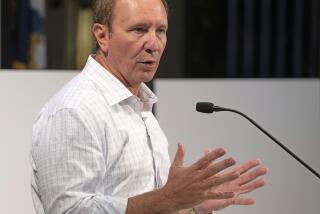Wilder Would Campaign as an Outsider : Politics: Potential presidential candidate would ‘Put America First.’ His combativeness may hurt his chances.
MANCHESTER, N.H. — Testing the presidential waters here last week, Democratic Gov. L. Douglas Wilder of Virginia coined a campaign slogan designed to spotlight President Bush’s alleged failure to meet this country’s domestic needs--”Put America First.”
But watching Wilder stump this state, where the first primary will be held, made clear that his expected candidacy will in reality be driven by a more fundamental and far more personal image: the outsider, personified by Wilder himself, challenging the national political Establishment.
As the grandson of slaves and the first elected black governor, Wilder has unique qualifications for the outsider role. Now he is striving to extend its dimensions well beyond the issue of race to the broad sweep of the national condition at a time of economic hardship and political deadlock.
“Perhaps the single most important role of any public official is to be an independent voice speaking for the people,” he said in kicking off his New Hampshire tour, “particularly when it becomes abundantly clear that so-called conventional wisdom is actually working against the best interests of the people.”
“You look at Gov. Wilder and you don’t see his color,” said former New Hampshire party Chairman George Bruno. “You see someone who has worked his way up from the bottom, who has wide appeal. Too many of our leaders in Washington today look too fat and too happy.”
In contrast with what he describes as the “jaded mentality” dominant in Washington, Wilder offers his own homemade ideological amalgam.
He appeals to conservatives by pointing to his balancing of Virginia’s budget by cutting spending rather than raising taxes. He advocates tough measures against drug offenders and supports capital punishment. On the liberal side, he is a vigorous backer of affirmative action and abortion rights and favors expanding health insurance, maintaining strict environmental safeguards and intensifying efforts to upgrade education and job training.
“He comes across as a tough guy who cares about a set of values that a whole lot of voters care about,” said Democratic Party national political director Paul Tully.
Because he cannot succeed himself after his one term as governor is up in 1993, Wilder says that for him “the future is now.” Although he is setting his sights on the presidency, he has not ruled out accepting the Democratic vice presidential nomination.
But party professionals think his chances of being selected as a running mate have been hurt by his operating style. His combativeness, demonstrated during a recent feud with Virginia Democratic Sen. Charles S. Robb, and his tendency to shoot from the hip have been stirring criticism and threatening to cost him support.
“I like his message but I don’t like the personal way he behaves politically,” said Al From, head of the Democratic Leadership Council, the centrist group that Robb helped found. “He has shown himself to be petty, mean and vindictive.”
In New Hampshire, Wilder was forced to interrupt his efforts to promote his “Put America First” theme to explain two controversial comments made before he arrived here.
One was his assertion that Supreme Court nominee Clarence Thomas’ views on abortion should be given extra attention because of Thomas’ Catholic education. In a meeting with party activists, Wilder contended that when he made his comment about Thomas he was “not thinking of religion” but rather of whether Thomas’ personal beliefs on abortion were so strong that they might lead him to override legal precedent.
The other flap was over his suggestion, made on the public television interview show “American Interests,” that Iraqi President Saddam Hussein’s assassination would help bring stability to the Mideast.
When pressed by reporters to explain what he had in mind, Wilder pointed out that he had said he would not violate the executive order banning the U.S. government from carrying out assassinations of heads of foreign countries. He then let the matter drop.
After the dust had settled, Wilder’s prospective candidacy appeared to have suffered no lasting damage. But, as Democratic state Chairman Chris Spirou pointed out, “He didn’t need that distraction” during his trip to the state. Moreover, Democrats were left to wonder when the governor’s sharp tongue would get him into trouble again.
At first glance, the 60-year-old Wilder hardly fits the image of a political bomb thrower. With his shock of white hair and gracious smile, he is dignified in appearance, courtly in bearing. He speaks in a mellow baritone, rich with the inflections of the Old Dominion.
But Wilder learned to play political hardball as he fought his way up the ladder to the governor’s office after starting life as a child in the Jim Crow South. “Here is a guy who has been told over and over again that he couldn’t do things he wanted to, and he did them anyhow,” said Joe Trippi, a veteran Democratic campaign manager who has been advising Wilder.
Wilder, inspired to become a lawyer by the epochal 1954 Supreme Court decision striking down school desegregation, opened his own office in Richmond and practiced for 10 years before 1969, when he became the first black since Reconstruction to win election to the state Senate.
In 1985 when he sought the lieutenant governorship, “people said I was crazy,” he told a reception of Democratic activists in Nashua last week. But he ran and won and, four years later, set out to become governor. “This time, people said I was certifiably insane,” he said.
But, by exploiting the resentment against his GOP opponent’s unyielding stand against abortion rights, Wilder parlayed 41% of the white vote and 96% of the black vote into a hairbreadth victory.
For this, he sees little reason to feel grateful to the Democratic Party leadership. “If all the oars were in the water when I was running, if all the Democrats were working for me, it (his share of the white vote) would have been over 50%,” he said in an interview as he shuttled between campaign stops.
No wonder then that his view of politics is shaped by the conflict between insiders and outsiders rather than between Democrats and Republicans.
Wilder denounced last fall’s bipartisan federal budget agreement because of what he considered its “regressive” tax increases. And, looking ahead to the 1992 campaign alignment, he said during the “American Interests” interview, “It’s going to be the party on the inside and the party on the outside, and I’ll be a part of that party on the outside.”
Wilder is the second Southern governor in recent years to build a presidential candidacy around the idea of campaigning against Washington insiders. The first was Jimmy Carter of Georgia, whose success in 1976 was made possible because Washington was in ill repute as a result of the Watergate scandals.
In 1991, as Wilder gears up to run against the Washington Establishment, the focus of resentment is the inability of the government to deal with the nation’s economic problems--chiefly the vast budget deficit, compounded by recession.
It is this problem that Wilder is seeking to address with his “Put America First” program. It has three main points:
--A $50-billion reduction in federal spending, which now totals about $1.5 trillion a year. Of this saving, $25 billion would be achieved by trimming “wasteful administrative expenditures.” The remainder would come from establishing spending priorities and “eliminating the less necessary $25 billion.” Wilder contends that he made cuts that were proportionately even greater in Virginia without hurting essential services.
--At least $35 billion in new tax breaks for the middle class. The tax reductions would help families pay for health care, education and child care and, Wilder contends, could be used to help create new jobs and industries.
--The remaining $15 billion saved by the spending cuts would be channeled to state and local governments to encourage them to try new solutions to resolve social problems. To get the money, state and local governments would have to present plausible plans for dealing with such problems as drug abuse and poverty.
Wilder’s prospects in the competition for the Democratic presidential nomination depend to some degree on whether the Rev. Jesse Jackson runs for a third time. If he stays on the sidelines, Wilder could draw the bulk of the black support that went to Jackson by margins of 90% or more in 1984 and 1988.
But Wilder may get more competition for black support than Jackson did from his white rivals. Former Massachusetts Sen. Paul E. Tsongas has already announced his candidacy, and Iowa Sen. Tom Harkin, Arkansas Gov. Bill Clinton and former California Gov. Edmund G. (Jerry) Brown Jr. are expected to enter the race. Nebraska Sen. Bob Kerrey has said he also is considering running.
On the other hand, Wilder has the potential to get a much bigger share of the white vote than did Jackson, who seemed to bump into a ceiling at around 15% of the white electorate. But, to cash in on that potential, Wilder will have to solve some fundamental problems that face his candidacy. The most obvious one is his lack of foreign policy experience.
Wilder told reporters here that he had “no criticism at all” of Bush’s foreign policy.
Like most of the other Democratic contenders, except Clinton, Wilder opposed U.S. military action in the Persian Gulf in January, although he now contends that he would have backed the use of force ultimately. University of Virginia political scientist Larry Sabato, who has followed Wilder’s career, believes that Wilder’s talk about terminating Saddam Hussein was inspired by his desire to show that he is no patsy in foreign affairs.
Still another problem is how he will find the time to run for President and run the state of Virgina. Campaigning here in New Hampshire for the Feb. 18 primary will occur while the Virginia Legislature is in session in Richmond dealing with crucial budget issues.
With Wilder basing his presidential hopes so heavily on his record as a fiscal manager, that Richmond debate is one he can hardly afford to ignore.
Profile: Lawrence Douglas Wilder
Born: Jan. 17, 1931
Hometown: Richmond, Va.
Education: BS in chemistry, Virginia Union University, 1951; law degree, Howard University School of Law, 1959
Career highlights: U.S. Army, 1952-53; promoted to sergeant, awarded Bronze Star for heroism in combat in Korea. Founder and former partner of the law firm Wilder, Gregory & Martin. Elected to Virginia Senate in 1969, reelected in 1971, 1975, 1979 and 1983. Headed committees on transportation, rehabilitation and social services. Elected lieutenant governor in November, 1985; headed National Democratic Lieutenant Governors Assn. Elected governor in November, 1989
More to Read
Get the L.A. Times Politics newsletter
Deeply reported insights into legislation, politics and policy from Sacramento, Washington and beyond. In your inbox three times per week.
You may occasionally receive promotional content from the Los Angeles Times.










